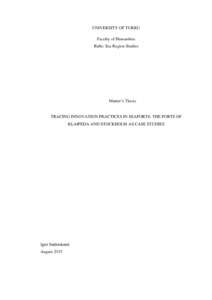Tracing Innovation Practices in Seaports: the Ports of Klaipeda and Stockholm as Case Studies
Stalmokaitė, Ignė (2015-10-13)
Tracing Innovation Practices in Seaports: the Ports of Klaipeda and Stockholm as Case Studies
Stalmokaitė, Ignė
(13.10.2015)
Turun yliopisto
avoin
Julkaisun pysyvä osoite on:
https://urn.fi/URN:NBN:fi-fe2015101314879
https://urn.fi/URN:NBN:fi-fe2015101314879
Kuvaus
Siirretty Doriasta
Tiivistelmä
This study explores variegated means through which ports have become increasingly entangled in the planning logic of neoliberal innovation-driven economy. The research topic belongs to the academic disciplines of economics and human geography. The aim of the thesis is to analyse how the notion of innovation, adopted in a variety of supranational and national port policy documents, is deployed in operational port environment in two different ports of the Baltic Sea Region: the port of Stockholm, Sweden, and the port of Klaipeda, Lithuania. This novel innovation agenda is visible in several topics I examine in the study, that is, port governance, environmental issues, and seaport – port-city interface.
The gathered primary source material on port policy documents, strategies, development planning documents and reports is analysed by utilizing the qualitative content analysis research method. Moreover, the empirical part of the case study, that is, tracing innovation practices in mundane port activities is based on collected qualitative semi-structured interviews with port authorities in Klaipeda and Stockholm, researchers and other port experts. I examine the interview material by employing the theoretical reading research method.
In my analysis, I have reframed port-related policy development by tracing and identifying the port transformation from “functional terminals” to “engines for growth”. My results show that this novel innovation-oriented rhetoric imprinted in the narrative “engines for growth” is often contested in daily port practices. In other words, my analysis reveals that the port authorities’ and other port actors’ attitudes towards innovations do not necessarily correspond to the new narrative of innovation and do not always “fit” within a framework of neoliberal economic thinking that glorifies the “culture of innovations”. I argue that the ability to develop innovative initiatives in the ports of Klaipeda and Stockholm is strongly predetermined by local conditions, a port’s governance model, the way port actors perceive the importance of innovations per se, demand factors and new regulations.
The gathered primary source material on port policy documents, strategies, development planning documents and reports is analysed by utilizing the qualitative content analysis research method. Moreover, the empirical part of the case study, that is, tracing innovation practices in mundane port activities is based on collected qualitative semi-structured interviews with port authorities in Klaipeda and Stockholm, researchers and other port experts. I examine the interview material by employing the theoretical reading research method.
In my analysis, I have reframed port-related policy development by tracing and identifying the port transformation from “functional terminals” to “engines for growth”. My results show that this novel innovation-oriented rhetoric imprinted in the narrative “engines for growth” is often contested in daily port practices. In other words, my analysis reveals that the port authorities’ and other port actors’ attitudes towards innovations do not necessarily correspond to the new narrative of innovation and do not always “fit” within a framework of neoliberal economic thinking that glorifies the “culture of innovations”. I argue that the ability to develop innovative initiatives in the ports of Klaipeda and Stockholm is strongly predetermined by local conditions, a port’s governance model, the way port actors perceive the importance of innovations per se, demand factors and new regulations.
